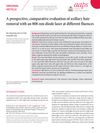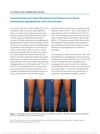15 citations,
August 2011 in “Lasers in medical science” The 755-nm alexandrite laser effectively and quickly treats trichostasis spinulosa with minimal pain and no side effects.
[object Object] 19 citations,
October 2017 in “Dermatologic Surgery” The alexandrite laser is a safe and effective treatment for Acne Keloidalis Nuchae.
 6 citations,
April 2012 in “Lasers in surgery and medicine”
6 citations,
April 2012 in “Lasers in surgery and medicine” Laser hair removal can cause a severe itchy rash in some allergic individuals, treatable with steroids.
 5 citations,
January 2015 in “Evidence-based complementary and alternative medicine”
5 citations,
January 2015 in “Evidence-based complementary and alternative medicine” Adding licorice gel to laser treatment is more effective for reducing facial hair than laser alone.
 April 2024 in “Cognizance journal”
April 2024 in “Cognizance journal” The alexandrite laser effectively reduces unwanted hair by about 75%.
82 citations,
May 2005 in “Dermatologic therapy” Laser hair removal has advanced to effectively reduce hair for various skin types and hair colors.
 26 citations,
April 1999 in “Dermatologic Clinics”
26 citations,
April 1999 in “Dermatologic Clinics” The long-pulsed alexandrite laser is effective for hair reduction, particularly for light-skinned individuals with dark hair, but caution is needed for darker skin.
 10 citations,
January 2000 in “Journal Of Cutaneous Laser Therapy”
10 citations,
January 2000 in “Journal Of Cutaneous Laser Therapy” Laser hair removal might also work by damaging blood vessels around hair follicles.
 September 2024 in “Electronic Journal of General Medicine”
September 2024 in “Electronic Journal of General Medicine” Laser hair removal can cause severe skin irritation, but it can improve with treatment.
143 citations,
January 2013 in “Dermatologic surgery” In-office laser hair removal works well long-term, especially Nd:YAG for darker skin, but home devices need more testing.
17 citations,
October 2017 in “Journal of cosmetic and laser therapy” Laser hair removal is effective and safe for reducing facial hair in women with PCOS and improves their psychological well-being.
 9 citations,
March 2005 in “Aesthetic surgery journal”
9 citations,
March 2005 in “Aesthetic surgery journal” The long-pulse alexandrite laser effectively removes hair permanently.
 May 2018 in “Journal of Cosmetic and Laser Therapy”
May 2018 in “Journal of Cosmetic and Laser Therapy” The editorial discusses the effectiveness and safety of various laser and energy-based cosmetic treatments.
 April 2019 in “Archives of aesthetic plastic surgery”
April 2019 in “Archives of aesthetic plastic surgery” Higher fluences in 808-nm diode laser treatments are more effective for axillary hair removal.
 March 2019 in “Applied sciences”
March 2019 in “Applied sciences” Laser therapy might help regrow hair in alopecia totalis better than steroids alone.
51 citations,
October 2002 in “Archives of dermatology” The document does not conclude the effectiveness of the 800-nm pulsed-diode laser for treating scalp cellulitis.
 31 citations,
April 1999 in “Dermatologic Clinics”
31 citations,
April 1999 in “Dermatologic Clinics” Nd:YAG laser can reduce hair with multiple treatments, but permanent removal isn't guaranteed.
 1 citations,
March 2019 in “Lasers in Surgery and Medicine”
1 citations,
March 2019 in “Lasers in Surgery and Medicine” The conference reported improvements in muscle volume, skin cancer diagnosis, facial and vaginal rejuvenation, and hair growth using various laser treatments.
 195 citations,
January 2008 in “Photochemistry and Photobiology”
195 citations,
January 2008 in “Photochemistry and Photobiology” Visible light can damage skin and most sunscreens don't block it well; more research is needed on its effects and protection methods.
 4 citations,
April 1999 in “Dermatologic Clinics”
4 citations,
April 1999 in “Dermatologic Clinics” Long-pulsed ruby lasers effectively reduce hair for up to 2 years with minimal pain.
 January 2009 in “Actas dermo-sifiliográficas/Actas dermo-sifiliográficas”
January 2009 in “Actas dermo-sifiliográficas/Actas dermo-sifiliográficas” Lasers and light treatments are now the most common ways to remove hair.
[object Object]  150 citations,
April 1999 in “Dermatologic Clinics”
150 citations,
April 1999 in “Dermatologic Clinics” Laser hair removal effectiveness depends on targeting hair structures without harming the skin, and improvements require more research and expert collaboration.
47 citations,
November 2000 in “Archives of dermatology” Pulsed infrared laser can effectively reduce symptoms of pseudofolliculitis barbae.
 4 citations,
September 2017 in “Dermatologic surgery”
4 citations,
September 2017 in “Dermatologic surgery” The combination therapy improved skin pigmentation.
 45 citations,
June 2004 in “Lasers in Medical Science”
45 citations,
June 2004 in “Lasers in Medical Science” Intense pulsed light (IPL) is an efficient and safe method for hair removal, reducing hair by about 80%.
 9 citations,
May 2005 in “Facial plastic surgery”
9 citations,
May 2005 in “Facial plastic surgery” Laser hair removal can be safe and effective for dark-skinned individuals with the right laser settings.
 101 citations,
June 2005 in “Journal of The American Academy of Dermatology”
101 citations,
June 2005 in “Journal of The American Academy of Dermatology” Very few people experience increased hair growth after laser hair removal, especially those with darker skin and black hair.
 73 citations,
April 1999 in “Dermatologic Clinics”
73 citations,
April 1999 in “Dermatologic Clinics” Lasers and light sources can effectively remove hair, work best on fair skin with dark hair, and usually need multiple treatments.
 17 citations,
January 2010 in “International journal of trichology”
17 citations,
January 2010 in “International journal of trichology” A man experienced hair loss from radiotherapy, which can be temporary or permanent depending on radiation dose, with potential treatments available.
 3 citations,
April 2017 in “Dermatologic Surgery”
3 citations,
April 2017 in “Dermatologic Surgery” Laser hair removal can be an effective last-resort treatment for men with stubborn Alopecia Areata who want to be uniformly bald.






















